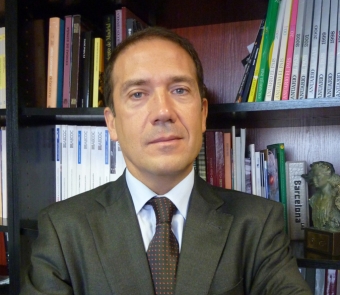José Montoro:“When it comes to exporting, companies could piggyback on Mercabarna's good international image"
Interview with José Montoro, managing director of Mercados Exteriores
Mercados Exteriores is a consultancy firm that specialises in exporting and which is working with Mercabarna via the Barcelona Food Cluster Association to help estate businesses seek common synergies to expand onto new markets.
Q- Is exporting a good option in the face of the financial crisis?
A- With the fall in sales on the domestic market, many SMEs are working hard to expand onto new markets. It is a good option, but the problem is that many are responding to economic pressure without making a strategic reflection and without having the right resources.
Q- What resources?
A- Firstly, having a person or team that specialises in learning about the countries you want to export to and the way business is done there. Secondly, earmarking part of your budget to international promotion. Thirdly, having a logistics company that specialises in fresh produce transportation. And fourthly, having the capacity to monitor international customers in both the pre- and post-sale periods.
Q- You need a bit of business clout, don’t you?
A- There’s no big secret when it comes to exporting. You apply the same rules you would for a customer here, but considering the environment and practices of the country you want to operate in. It’s true that a small business will have a harder time of it if it wants to establish a stable agreement with an international customer rather than just make the occasional sale, because it involves complex logistics, large volumes, continuity of deliveries, etc.
Q- Which markets could be of most interest to Mercabarna businesses?
A- I would say Russia, Poland, the Czech Republic, Hungary, the Ukraine and other Baltic countries.
Q- Why them?
A- Because they are countries that are starting to discover and value the importance and benefits of the Mediterranean diet, where fresh produce is fundamental. So the demand for fruit, vegetables and fish is growing and will continue to grow at a pace that can no longer be matched on the domestic market.
Q- And what about more traditional markets, like France or Italy?
A- They are stable markets where Mercabarna businesses already have a significant presence. But these days it’s very hard to increase market share. Growth on those markets involves making investments or offering huge price reductions.
Q- What are the problems involved with exporting to these “new” countries?
A- First off, the practices of the foodstuff sector in these countries, where payment conditions and product quality standards can be different to what we are used to. Also, it can be tricky finding the people to promote the products and striking a deal with them, as not all of these countries organise specialised trade fairs. Often we run up against problems of communication, because English isn’t commonly spoken in some of them, or when it comes to certain customs procedures.
Q- So quite a few stumbling blocks then!
A- They may seem like big problems, but they can be sorted out with good planning and good knowledge of the environment you are sending your products to.
Q- OK, so I've made up my mind. What's the next step?
A- To prepare a competitive bid. Perhaps to start with you should base your strategy on price, but once you have a sales relation up and running you can negotiate and improve your position.
Q- Any other recommendations?
A- Really put some thought into the markets that would be the most suitable and find out all you can about them. And seek the support of institutions or companies that specialise in exporting. Another good strategy could be to consider joint actions...
Q- What do you mean exactly?
A- Companies here could work together on logistics, grouping together orders to simplify deliveries and make them cheaper. They could also piggyback on Mercabarna’s good international image as a purchasing hub of southern Europe, where there are a number of companies that sell quality, healthy goods. And, if we add Barcelona’s international projection as a business hub and the city’s logistics infrastructures, we find ourselves in an extremely positive export environment.













